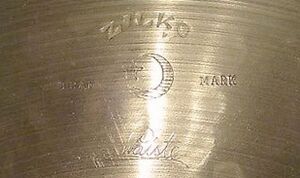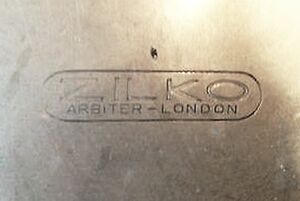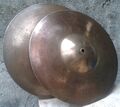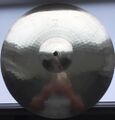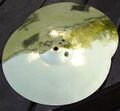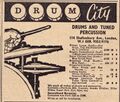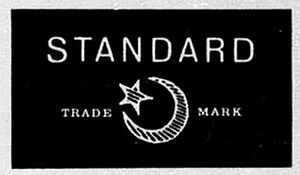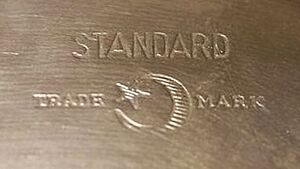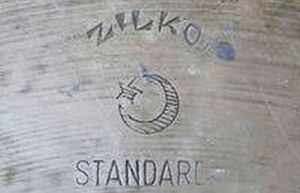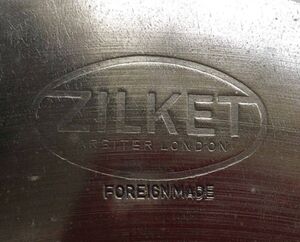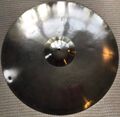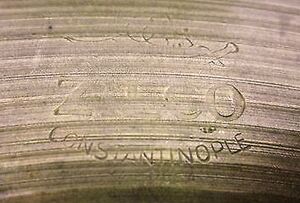Difference between revisions of "Paiste Zilko"
| Line 1: | Line 1: | ||
__NOEDITSECTION__ | __NOEDITSECTION__ | ||
== Zilko == | == Zilko == | ||
| − | [[File:Zilko-Paiste.jpg|thumb|right| | + | [[File:Zilko-Paiste.jpg|thumb|right|300px|Post 1957 Swiss logo]] |
<div style="float:right">__TOC__</div> | <div style="float:right">__TOC__</div> | ||
| − | [[File:Zilko.jpg|thumb|right| | + | [[File:Zilko.jpg|thumb|right|300px|1950s brass German Zilko logo]] |
| − | [[File:Zilko arbiter.jpg|thumb|right| | + | [[File:Zilko arbiter.jpg|thumb|right|300px|~1963 Dallas Arbiter Zilko logo]] |
| − | '''Introduction:''' Post war possibly | + | '''Introduction:''' Post war possibly 1948<br> |
| − | '''Discontinued:''' | + | '''Discontinued:''' 1957ish (replaced by the NS12 Zilko standard)<br> |
'''Alloy:''' [[Identify_Your_Paistes#Brass|Brass MS63]]<br> | '''Alloy:''' [[Identify_Your_Paistes#Brass|Brass MS63]]<br> | ||
| Line 25: | Line 25: | ||
14" through 18" and 20"<br> | 14" through 18" and 20"<br> | ||
| − | |||
*At some point between 1953 and 1957 a 14" Hi Hat option is added to the Zilko line.<br> | *At some point between 1953 and 1957 a 14" Hi Hat option is added to the Zilko line.<br> | ||
| Line 32: | Line 31: | ||
11" through 16", 18", and 20"<br> | 11" through 16", 18", and 20"<br> | ||
*Looks like Arbiter started carrying Paiste (with alternate embossing and series names: Arbiter Custom 602, Custom, Zilko, Zilket) in 1962. These were sold until at least 1966 and maybe as late as 1968, by 1969. <br> | *Looks like Arbiter started carrying Paiste (with alternate embossing and series names: Arbiter Custom 602, Custom, Zilko, Zilket) in 1962. These were sold until at least 1966 and maybe as late as 1968, by 1969. <br> | ||
| − | Arbiter started carrying standard Paiste branded product lines except for the | + | Arbiter started carrying standard Paiste branded product lines except for the Zilkets which were sold until the early 1970s.<br> |
<gallery> | <gallery> | ||
File:Early zilko logo.jpg|Late 40's brass German Zilko logo | File:Early zilko logo.jpg|Late 40's brass German Zilko logo | ||
| Line 47: | Line 46: | ||
File:Paiste 50 catalog 1.jpg|1950 catalog: six panel catalog and price list from the early days of the company in Germany, back when they only offered Stambul and Zilko. | File:Paiste 50 catalog 1.jpg|1950 catalog: six panel catalog and price list from the early days of the company in Germany, back when they only offered Stambul and Zilko. | ||
File:Paiste 50 catalog 2.jpg| | File:Paiste 50 catalog 2.jpg| | ||
| − | File:1963 arbiter advert.jpg|Drum City London ad from 1963. Shows the Arbiter metal stamped Paiste lines were all available at this time | + | File:1963 arbiter advert.jpg|Drum City London ad from 1963. Shows the Arbiter metal stamped Paiste lines were all available at this time. |
</gallery> | </gallery> | ||
| + | |||
__NOEDITSECTION__ | __NOEDITSECTION__ | ||
== Zilko Standard/Standard == | == Zilko Standard/Standard == | ||
<div style="float:right">__TOC__</div> | <div style="float:right">__TOC__</div> | ||
| − | [[File:Standard logo.jpg|thumb|right| | + | [[File:Standard logo.jpg|thumb|right|300px|]] |
| − | [[File:Standard logo 1.jpg|thumb|right| | + | [[File:Standard logo 1.jpg|thumb|right|300px|]] |
| − | [[File:Zilko standard.jpg|thumb|right| | + | [[File:Zilko standard.jpg|thumb|right|300px|Note: there is no "TRADE MARK" to the sides of the moon and star, there is also no "M. Paiste" signature, at some point, those elements were added to the German made Zilkos]] |
| − | '''Introduction:''' | + | '''Introduction:''' about 1958<br> |
| − | '''Discontinued:''' | + | '''Discontinued:''' 1963 (replaced by the Dixie)<br> |
'''Background:''' <br> | '''Background:''' <br> | ||
| − | Not to be confused with the "Ludwig Standard" line of cymbals, these were produced before the Ludwig's but the name could've been transferred post | + | Not to be confused with the "Ludwig Standard" line of cymbals, these were produced before the Ludwig's but the name could've been transferred post 1963 (Paiste had a bad habit of reusing names for different products of different quality).<br> |
| − | We have proof of the "Standards" existence from the back cover of | + | We have proof of the "Standards" existence from the back cover of a late 50's catalog (see below), unfortunately, we do not have the inside pages to the catalog, so we have no data on types and sizes offered on this series, early 1960s catalogs need to be found to answer these questions, Paiste customer service has confirmed they were made until around 1963 or so.<br> |
| − | + | It's possible they were stamped "Standard" in Switzerland and "Zilko Standard" in Germany or the stamping could have changed in time: Zilko Standard at first, Standard later.<br> | |
| − | It's possible they were stamped "Standard" in Switzerland and "Zilko Standard" in Germany or the stamping could have changed in time: Standard at first, | ||
It's unclear on the stamping variations, but Paiste confirmed they are the same cymbal regardless of how the logo was applied.<br> | It's unclear on the stamping variations, but Paiste confirmed they are the same cymbal regardless of how the logo was applied.<br> | ||
| − | + | The Standard and Zilko Standard were made from NS12 (Nickel Silver alloy), they were the lower budget line at the time. We do know that the Standard series had 14" hi-hats and an 18", whether it was a crash or a ride, we do not know and a 16" crash, as part of their offering.<br> | |
| − | The Standard and Zilko Standard were made from NS12 (Nickel Silver alloy), | ||
'''Alloy:''' [[Identify_Your_Paistes#Nickel Silver|Nickel Silver]]<br> | '''Alloy:''' [[Identify_Your_Paistes#Nickel Silver|Nickel Silver]]<br> | ||
'''Quality:''' Budget, student, entry level<br> | '''Quality:''' Budget, student, entry level<br> | ||
| − | |||
| − | |||
<gallery> | <gallery> | ||
| − | File:57 catalog back cover.jpg| | + | File:57 catalog back cover.jpg|Late 50's ('59?) catalog |
File:14 standard hi hats.jpg|Standard NS12 14" hi-hats | File:14 standard hi hats.jpg|Standard NS12 14" hi-hats | ||
File:Standard cymbal.jpg|Standard 16" or 18" | File:Standard cymbal.jpg|Standard 16" or 18" | ||
File:Zilko standard 1.jpg|German Zilko standard | File:Zilko standard 1.jpg|German Zilko standard | ||
</gallery> | </gallery> | ||
| + | |||
| + | |||
| + | |||
| + | |||
| + | |||
| Line 88: | Line 89: | ||
==Arbiter Zilket== | ==Arbiter Zilket== | ||
<div style="float:right">__TOC__</div> | <div style="float:right">__TOC__</div> | ||
| − | [[File:Zilket arbiter.jpg|thumb|right| | + | [[File:Zilket arbiter.jpg|thumb|right|300px|Dallas Arbiter Zilket logo]] |
'''Introduction:''' 1965*<br> | '''Introduction:''' 1965*<br> | ||
| Line 97: | Line 98: | ||
'''Background:'''<br> | '''Background:'''<br> | ||
| − | + | The only records we have are from the mid-1960's to the early 1970's and they were from distributor catalogs & price lists (Arbiter lists them in thier '71/'72 catalog). Due to the time frame, it's most likely that the early versions of this cymbal line were made of NS12 (Nickel-silver alloy), then later, post 1970 from B8 (most of the conversion from NS12 to B8 took place somewhere from 1966 to 1970). Arbiter Zilkets were most likely rebranded [https://www.cymbal.wiki/wiki/Paiste_Super#Super Supers]. We do know they were made for beginners, advanced students, schools and small combos.<br> | |
| − | Arbiter Zilkets were most likely rebranded [https://www.cymbal.wiki/wiki/Paiste_Super#Super Supers] | ||
The following types and sizes were available during this time frame:<br> | The following types and sizes were available during this time frame:<br> | ||
| Line 111: | Line 111: | ||
</gallery> | </gallery> | ||
==Zildjian Zilco's== | ==Zildjian Zilco's== | ||
| − | [[File:Zilco.jpg|thumb|right| | + | [[File:Zilco.jpg|thumb|right|300px|1930's Zildjian Zilco]] |
Not to be confused with Paiste's "Zilko", Zildjian's "Zilco" was spelled with a "C" instead of a "K".<br> | Not to be confused with Paiste's "Zilko", Zildjian's "Zilco" was spelled with a "C" instead of a "K".<br> | ||
They were released in the 1930's well before Paiste's Zilko was but they were not a separate "standalone" line of cymbals:<br> | They were released in the 1930's well before Paiste's Zilko was but they were not a separate "standalone" line of cymbals:<br> | ||
| Line 117: | Line 117: | ||
Zilcos were A Zildjian quality control rejects that were re-sold cheaply, including the Swish cymbals and others sized from 9˝ to 12˝."<br> | Zilcos were A Zildjian quality control rejects that were re-sold cheaply, including the Swish cymbals and others sized from 9˝ to 12˝."<br> | ||
[https://lododrumguy.com/blog/2015/9/1/zildjian-history-zilco-cymbals VINTAGE CYMBAL HISTORY: ZILDJIAN'S “CHEAP” ZILCO CYMBAL LINE]<br> | [https://lododrumguy.com/blog/2015/9/1/zildjian-history-zilco-cymbals VINTAGE CYMBAL HISTORY: ZILDJIAN'S “CHEAP” ZILCO CYMBAL LINE]<br> | ||
| − | |||
Revision as of 15:54, 23 March 2022
Zilko
Introduction: Post war possibly 1948
Discontinued: 1957ish (replaced by the NS12 Zilko standard)
Alloy: Brass MS63
Quality: economy or general, mid-level cymbal
Background:
Paiste relocated to Germany in 1945 and most likely started Zilko production in 1948/49, they were produced using MS63 (brass alloy). We do know that these cymbals were not considered, top-of-the-line, rather they were intended as an economy or general, mid-level cymbal. We don't exactly know what Paiste originally offered size wise (pre 1950), however here's what we do know and includes the following types and sizes:
PAISTE 1950/52/58 CATALOG:
Thin & Medium:
9" through 14" (Jazz type cymbals)
"Charleston" (hi-hats in pairs):
9" through 13" *Note: Hi hat cymbals were referred to as "Charleston" cymbals
Marching "Chinese style" (in pairs):
14" through 18" and 20"
- At some point between 1953 and 1957 a 14" Hi Hat option is added to the Zilko line.
ARBITER Ltd. '66 PRICE LIST: (No weight designated)
11" through 16", 18", and 20"
- Looks like Arbiter started carrying Paiste (with alternate embossing and series names: Arbiter Custom 602, Custom, Zilko, Zilket) in 1962. These were sold until at least 1966 and maybe as late as 1968, by 1969.
Arbiter started carrying standard Paiste branded product lines except for the Zilkets which were sold until the early 1970s.
Zilko Standard/Standard
Introduction: about 1958
Discontinued: 1963 (replaced by the Dixie)
Background:
Not to be confused with the "Ludwig Standard" line of cymbals, these were produced before the Ludwig's but the name could've been transferred post 1963 (Paiste had a bad habit of reusing names for different products of different quality).
We have proof of the "Standards" existence from the back cover of a late 50's catalog (see below), unfortunately, we do not have the inside pages to the catalog, so we have no data on types and sizes offered on this series, early 1960s catalogs need to be found to answer these questions, Paiste customer service has confirmed they were made until around 1963 or so.
It's possible they were stamped "Standard" in Switzerland and "Zilko Standard" in Germany or the stamping could have changed in time: Zilko Standard at first, Standard later.
It's unclear on the stamping variations, but Paiste confirmed they are the same cymbal regardless of how the logo was applied.
The Standard and Zilko Standard were made from NS12 (Nickel Silver alloy), they were the lower budget line at the time. We do know that the Standard series had 14" hi-hats and an 18", whether it was a crash or a ride, we do not know and a 16" crash, as part of their offering.
Alloy: Nickel Silver
Quality: Budget, student, entry level
Arbiter Zilket
Introduction: 1965*
Discontinued: 1974*
Pending further investigation.*
Alloy: Nickel Silver - CuSn8
Background:
The only records we have are from the mid-1960's to the early 1970's and they were from distributor catalogs & price lists (Arbiter lists them in thier '71/'72 catalog). Due to the time frame, it's most likely that the early versions of this cymbal line were made of NS12 (Nickel-silver alloy), then later, post 1970 from B8 (most of the conversion from NS12 to B8 took place somewhere from 1966 to 1970). Arbiter Zilkets were most likely rebranded Supers. We do know they were made for beginners, advanced students, schools and small combos.
The following types and sizes were available during this time frame:
DALLAS-ARBITER '69 & '71-'72 CATALOGS: (No weight designated)
14" hi hats, 16", 18" and 20"
Zildjian Zilco's
Not to be confused with Paiste's "Zilko", Zildjian's "Zilco" was spelled with a "C" instead of a "K".
They were released in the 1930's well before Paiste's Zilko was but they were not a separate "standalone" line of cymbals:
"Starting in the late '30's the Zilco name was used on cheaper Zildjians that were about a quarter of the price of the regular line.
Zilcos were A Zildjian quality control rejects that were re-sold cheaply, including the Swish cymbals and others sized from 9˝ to 12˝."
VINTAGE CYMBAL HISTORY: ZILDJIAN'S “CHEAP” ZILCO CYMBAL LINE
Information from: Todd Little, Mark Carlson, Dan Garza
Return to the Main Page
Return to the Paiste Series Portal
Return to the Paiste Cymbal Type Portal

